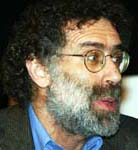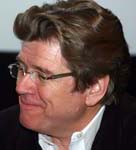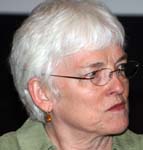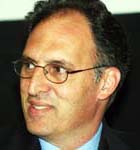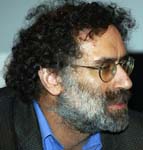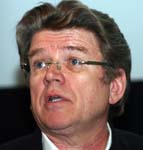| Youth and Civic Engagement |
||||||
|
Thursday, April 24, 2008 Ingeborg Endter is the outreach manager for the MIT Center for Future Civic Media and a graduate of the electronic publishing group at MIT’s Media Lab where her research focused on creating collaborative community uses of the Internet. She previously served as a program manager for the Computer Clubhouse Network, a collaboration between the Boston Museum of Science and Media Lab that provides an after-school learning environment where young people from under-served communities use technology for creative self-expression. Alan Khazei is founder and CEO of Be the Change, a non-partisan citizens' civic organization. He co-founded and previously served as CEO of City Year, a youth service corps that enlists more than 1,200 young adults in 16 communities across America and in Johannesburg, South Africa for a year of full-time community service. Moderator: Mitchel Resnick directs the Lifelong Kindergarten research group at the MIT Media Laboratory where he serves as head of the Media Arts and Sciences academic program. He is a principal investigator for the MIT Center for Future Civic Media. Co-sponsor: MIT Center for Future Civic Media A podcast of Youth and Civic Engagement is now available. A webcast of Youth and Civic Engagement is now available. By Helene Moorman Photos by Greg Peverill-Conti [this is an edited summary, not a verbatim transcript] Moderator Mitch Resnick opened the discussion by distinguishing between "involvement" and "engagement." Involvement is an increased activity level in civic pursuits such as voting or community service. Engagement goes beyond this. It means working actively and collaboratively to get one's ideas heard and bring about meaningful change in the community. Resnick also noted the link between civic engagement and media engagement. Today's youth is very active with many types of new media, but again, there is a distinction between involvement (increased use) and engagement (using media to effect change). New media should be utilized not just to spread one's voice, but to become more expressive. Resnick then invited the panelists to share their thoughts. To help explain why young people today are wary of politics, Lance Bennett talked about some of the sweeping societal changes that have occurred over the past 40-50 years. Modern society has involved large membership organizations with complex social hierarchies. This is now beginning to change, to move toward what is known as a "late modern social formation," in which person-centered social networks, distributed organizations, and participatory media are much more important. This changed environment affects the civic identity of the young people who are born into it; their sense of duty toward participation in government is relatively weak compared to previous generations. The popularity of participatory media today implies that young people would be more inclined to engage in politics if they were responsible for some of its content. Bennett presented some examples of this type of engagement, including a video called “Obama Girl," an (unofficial) pro-Obama music video viewed more than eight million times on YouTube. Although it was produced by professionals, it is participatory in the sense that many ordinary people watched it, rated it, commented on it, and shared it with others. Compare this, Bennett suggested, with the most-viewed McCain video on YouTube, which is essentially a conventional campaign ad, and has only received 250,000 views. Shifting his focus to education, Bennett lamented the state of civics education in schools. Successful civics lessons bring students outside the classroom and into the community, but that type of teaching requires a lot of resources. Online learning environments have a lot of potential because they can be enhanced by tools that can be distributed. He cited a few examples, including a Facebook application called Your Revolution that gives users ways to encourage their friends to register to vote. Bennett conceded that online civics education presents problems as well as advantages; established online resources are not attractive to young people because they are mainly created by the government and NGOs, but sites built by students themselves have a hard time finding an audience. Most of these sites also fail to advise kids on how to actually define, publicize, and assess issues for themselves. Ingeborg Endter discussed the Computer Clubhouse Network, a project she was involved with for seven years. Clubhouses are gathering places that give school-age children access to high-end computer equipment to explore and build on their interests. The idea is to cultivate a community where under-served youth can teach and learn in an environment of trust and respect. Clubhouses provide places where members can feel both physically and creatively safe, which empowers the kids and enriches the community. Endter offered a number of examples of community engagement in Computer Clubhouses, such as a group in Sao Paulo, Brazil that worked with local artists to beautify the neighborhood with murals. Alan Khazei spoke about his experience in co-founding the service organization City Year, which later became the basis for Americorps. His dream was to create a model for youth national service, and to show the country that the younger generation was willing and able to participate. Five years ago, Americorps suddenly faced an 80% budget cut. In a massive effort to save the program, Khazei helped mobilize citizens from 47 states to testify for 100 hours on Capitol Hill, resulting in the restoration of much of the funding. Unfortunately, as soon as the advocacy died down, the program began to see cuts again. Believing there must be a better approach to large-scale community engagement, Khazei founded his current organization, Be The Change. Khazei thinks this country needs a new philosophy about solving big problems. One essential element of this philosophy is massive citizen engagement, beginning in youth and continuing throughout life. Also very important is a system that can take all the wonderful entrepreneurial service models that exist and scale them up. Teach for America is a good example of this problem; that organization receives over 30,000 applicants each year but only has the resources to accept 5000 of them. Finally, government needs to take on a new role that involves greater interaction with and support of private enterprises devoted to civic improvement. According to Khazei, the "Millennial" generation has both the opportunity and the potential to lead us to this new philosophy. They are volunteering at higher levels than any generation. A large majority of them are paying close attention to presidential politics, and 71% believe political engagement is an effective way of solving important issues. They are less ideological and more practical than their parents in approaching problems. Khazei's hope for Be The Change is to really engage Millennial and all citizens so that this potential can be realized. Khazei then discussed the need for approaches to civic engagement that have a capacity to transform the system on a large scale. He is a proponent of what he called a "meta action tank," in which multiple groups, organizations, and individuals combine their voices and resources to effect change beyond their individual scopes. He listed a few examples of groups that are accomplishing this by working to create large advocacy networks for their causes instead of just performing social services. The panelists' comments were followed by a question and answer session: QUESTION: What are the most important things we can do as a society to support young people in learning how to engage? BENNETT: We need to teach kids to organize and communicate effectively so they can become exceptional entrepreneurs and advocates for their causes. We also need to think about ways to get kids who are unlikely to participate engaged with issues that matter to them. KHAZEI: If we had a universal national service system, we'd see higher levels of engagement throughout people's lifetimes. Graduates of City Year are proving this: they vote, volunteer, and contribute to political causes at higher rates than their peers. You can't learn citizenship by reading about it in a book, you have to do it. We also need to come up with ways to support young people who are interested in civic advocacy, because they are the ones who will build organizations that will get their peers involved as well. ENDTER: I agree that we need to help younger children develop the skills they need to become engaged. Some emerging projects in our Center right now are tackling this through storytelling and by encouraging kids to really understand the dynamics and history of their community and their place within it. QUESTION: What is the unique role of youth in civil society? BENNETT: The youth voice has not traditionally been very loud or well organized, and the professionalization of the political communication process has suppressed it even further, because campaign managers typically ignore young people. In terms of what that voice could be, the Obama campaign is an interesting example. Young people are creating content very effectively and making the campaign more fun and engaging. But I think there are even bigger roles in civil society for young people, education reform being one great example. The schools in this nation are a catastrophe, and students are perfect advocates because they are the ones most affected. They could have an enormously effective voice if given the skills to communicate in high impact ways. ENDTER: There are many areas where youth are much empowered as older generations were not. But I see a great disparity across different economic statuses, and this issue is growing. Young people who don't have access to the same technology and education as their more privileged peers are not empowered, and this movement is leaving too many of those kids behind. KHAZEI: The role for young people in civil society is absolutely essential. Historically, they have always been at the forefront of big efforts for change, as both leaders and followers. The tools available now for young people to organize and be heard are unprecedented, and I think we all need to encourage that. We should all be held accountable for shaping the kind of world we want to have. QUESTION: How can ordinary, working citizens who may not be able to physically volunteer support grassroots empowerment of youth? ENDTER: It's hard. Our Clubhouses' hours make it difficult for working people to volunteer. We rely heavily on students, retired people, and former Clubhouse members for mentors, but it's still hard to get the manpower that's needed to really support the kids. Some companies give employees free time during the day to do volunteer work, and that might be a good solution. But this is an issue that many organizations struggle with. KHAZEI: If we had a system where a million young people a year were devoted to full time service, this would not be such a problem. Not only could those full-time people provide much of the actual work that's required, they could help to organize and direct themselves and other part-time volunteers. There is also a lot of potential for service in the baby boom generation; these are people that are living longer, healthier lives, and who have incredible skills that could be exploited. There should be more opportunities for baby boomers that are not interested in retiring but are looking for encore careers to get involved in these efforts. RESNICK: It's important for institutions as well as individuals to get involved in their communities. There are many companies who will make monetary donations to community causes, but there are far fewer who will actually do things (like work release time) to encourage their employees to get deeply engaged. Schools, too, have potential to function as full-time community centers instead of closing their doors at the end of the school day. It's time to rethink what it means for institutions to be meaningfully involved in the community. QUESTION: What about tax credits rather than direct funding from the government for some of the ideas and programs that have been described? KHAZEI: Tax credits are great, but there is a lot of money within the government right now that's not being used effectively. Even a very small percentage of the federal budget would make an enormous difference if it were allocated to social entrepreneurs on a competitive basis. Private philanthropy and tax credits just aren't enough, so we need to look at both strategies. BENNETT: The PugetSoundOff funding situation is an interesting model. When the city of Seattle offered a cable license renewal to Comcast, they asked the company to contribute half a million dollars to a public media fund, and it was decided that youth engagement would be the most suitable deployment of that money. This is an easy model that other cities should be thinking about adopting. QUESTION: Even with the tools and support that have been discussed, are most young people actually going to be willing to go beyond what's easy or fun in order to really commit themselves to social change? BENNETT: It's true that sometimes service is performed to meet a requirement or to pad a resume instead of as a serious commitment, but there are truly motivated young people out there who are excited about the opportunity to develop content and share it with others. We have 75 or so interns a year on our projects, many of whom are not even getting credit any more, and they are all working enthusiastically. I don't think this type of motivation is particularly rare. ENDTER: It takes a skilled teacher or youth worker to effectively match students with a cause that really engages them, and then to use that enthusiasm to spark interest in other areas as well. Finding people who can do this is the key. QUESTION: What does it mean to be a community organizer? Does one have to be a member of the community they serve? KHAZEI: You don't have to be a member of a community in order to serve it, but you do have to have humility and empathy in order to be effective. People who go back and work to improve the communities they grew up in often succeed quickly, but anyone who is open to learning about a community can make a difference in it. It's especially important to get people from privileged backgrounds involved in service, because they are often the ones who have access to power and resources. QUESTION: Getting people engaged at the local level seems somewhat simpler than at a national (or international) level because they are more likely to have knowledge and experience of the issues they will be dealing with. How can we address the challenges of creating a national service effort across the diverse range of problems that exist? BENNETT: One of the things I study is the use of technology to facilitate the spread and organization of large social networks. Look at the 2003 global antiwar protest, the largest organized protest in human history. Technological facilitation played an important part in making it so large. Another thing that allowed it to work was that many people temporarily dropped their particular organizational identities in order to join together en masse around this common cause. And that loosening in turn presented people with a chance to network on an individual level with people from other organizations. Of course, there is a question of sustainability for movements based on this kind of loose network, but it's still a good example of the importance of technology and individual networking in effecting action on a large scale. ENDTER: There are some great recent examples of internet and cell phone technology being used for national and international engagement. The large-scale aid responses to Katrina and the tsunami illustrate how powerful these tools can be in coordinating these kinds of huge efforts. QUESTION: What is a realistic role for public schools in the encouragement of civic engagement? BENNETT: Stop testing the life out of students and let them go out into the community and find out what's going on there! We have to figure out ways to make hands-on civic education more attractive for schools to implement, especially in poorer districts. ENDTER: It's going to take really dedicated teachers who are actually allowed to teach. They are out there, and the less they are forced to be involved with bureaucracy the better. Educators should be allowed to decide about what is good education policy. QUESTION: Is understanding history seen as part of a civic obligation? How do we connect history to students' lives? BENNETT: During the WTO protests in Seattle some colleagues and I sent out students to document what we viewed as history in the making. The students were very excited about it, and ended up helping to organize the material they collected, even getting the libraries interested in archiving it. If we can recognize contemporary historical moments like that and get kids involved in recording and capturing them, then that might be a bridge to a deeper appreciation of other historical events. QUESTION: What about the intergenerational issues involved in civic engagement? ENDTER: We take this issue very seriously in the clubhouses. One interesting issue that comes up, especially in immigrant communities, is the disempowerment of older people because of language barriers. Young people are learning all of these wonderful new skills, but the parents and grandparents are left behind because they don't know enough English. To solve this, we are trying to bring the older generation into the clubhouses to work with the kids and learn from them to try to lessen these disparities.
|
||||||

